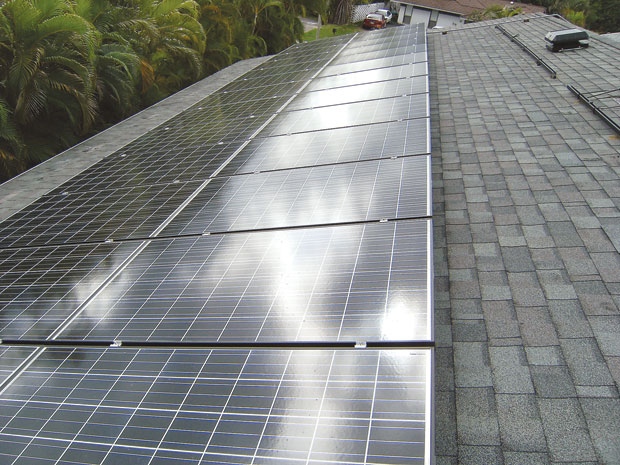Kyocera has been manufacturing solar modules for more than 35 years, far longer than most manufacturers in the industry today. The Kyocera modules will probably never be the cheapest in the industry, but there are none constructed better. In the end, since these modules will last longer and continue to produce at a higher level of energy production, they will be the lowest cost investment you can make.
Knowledge of module construction should be an important part of your decision-making process since poorly manufactured modules, which reside on the roof and are exposed to the effects of our corrosive environment, will fail. The quality of the packaging that surrounds the cells consists of the metal frame, the glass cover and backing material. Packaging degradation during normal surface life will affect the function and integrity of the module. It can lead to performance issues such as poor energy production, array performance failure, and even lead to safety hazards inclusive of electric shock hazard.
Kyocera incorporates into its modules features that protect the electronics of the modules and also ensures the long life of your investment. The following features make Kyocera the best choice when purchasing a solar system:
1. Silicon potting of Junction Box.
Kyocera completely embeds the junction box components that reside on the underside of the modules in a total cover of silicon. The process is very similar to underground cables that have the wires surrounded by a gel to prevent moisture from ever reaching the wires. Most manufacturers just place a bead of silicon around the junction box to seal. The junction box is where all of the electricity produced in the module is concentrated to connectors that take power to the inverter.
2. Support bars on backside of modules.
Because of the thin nature of wafers that make solar cells today, cells are highly susceptible to small fractures in manufacturing, shipping, installation and service-life movement. Fractures in cells become hot spots, get larger over time, affect other cells in the series they are wired to and produce less power. Kyocera has optimally placed the bars to support the cells in the solar module, protecting the cells in the solar module. By using Electrical Illumines Photography, studies are showing that solar modules purchased from leading solar manufacturers have numerous fractures in the cells of their modules, and this is going to have a long-term effect on system performance.
3. Heavy-Duty Frame Construction.
Kyocera uses tubular construction for frames rather than single-wall construction. Tubular construction is stronger, stiffer and will protect the module construction far better than single-wall construction.
4. TUV RHEINLAND Long-Term Sequential Testing.
Kyocera is the only module to pass this long-term test. The same module is tested for exposure to damp heat, thermal cycling, humidity freeze and bypass diode thermal for 12 months. The short-term test that all modules must meet is the IEC61215 and it uses four separate modules for each test for 1,000 hours. Long-term testing is obviously a better indicator of quality than a minimum test. Interestingly it was found that many modules start to fail after meeting the minimum requirements, showing how manufacturers are building only to meet the lowest requirements.
5. Desert Knowledge Australia Independent Testing.
Kyocera is the No. 1 producer of kWH per watt when compared to the other major manufacturers. DKA purchased the modules from distributors rather than obtaining them from the manufacturers. This independent test has ranked Kyocera as the No. 1 performer since October 2008 over manufacturers who supposedly are more efficient.
6. Testing for Quality.
Kyocera always tests its products to ensure zero defects. Over the last 10 years, there has never been a module returned to the local distributor for replacement.
Pacific Islands Construction believes that an informed consumer will make a better decision when purchasing a solar energy system. If you believe in quality, then Kyocera is the best choice for solar, and since Pacific Islands Construction is a licensed roofer/contractor, we can ensure the best installation on your roof.
Call Pacific Islands Construction at 841-7756 or visit our website at pacificislandsconstruction.net.
CONTACT: 841-7756
WEBSITE: pacificislandsconstruction.net

See more articles from: Pacific Islands Construction